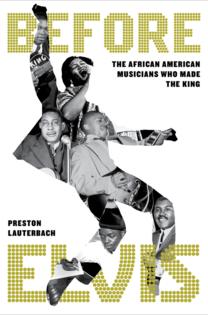Review: A look at the trailblazing musicians who came 'Before Elvis'
Published in Books News
Music is the most cannibalistic creative endeavor, with musicians not only drawing inspiration from predecessors and contemporaries, but often imitating specific techniques, stealing catchy riffs or covering entire songs.
For music historian Preston Lauterbach, Elvis Presley stands out as an artist who synthesized a remarkable range of styles — “Black and white, urban and rural, spiritual and unholy,” becoming “the most quintessentially American musician ever.” But Presley is also “our most polarizing musician,” according to Lauterbach, someone many continue to believe ascended to his throne as the “King of Rock and Roll” only by taking credit from Black musicians who preceded him.
In his new book, “Before Elvis,” the author of “Beale Street Dynasty” addresses that perception through the story of several Black artists who influenced Presley’s career. All were indeed victimized to various degrees, but the fault lies not with Elvis but a recording industry and society that exploited them. Lauterbach’s subjects include three musicians who famously wrote or recorded songs that became synonymous with Presley.
Arthur Crudup wrote “That’s All Right,” Elvis’ first commercial recording; “Big Mama” Thornton had a No. 1 rhythm-and-blues hit with “Hound Dog” three years before Presley first sang the song; and Junior Parker penned “Mystery Train,” which — per Lauterbach — is “widely considered Elvis’ finest recording.” All three enjoyed remarkable early careers but very different twilights.
Crudup and Parker lost both copyrights and residuals from their catalogs thanks to industry practices that still target artists today, but Thornton no longer should be seen as a victim, Lauterbach writes. She had a robust late career as an unlikely part of San Francisco’s 1960′s scene, landing representation by Bill Graham, playing gigs with Jefferson Airplane and the Grateful Dead and inspiring another young artist in Janis Joplin, who idolized Thornton and recorded her unreleased song “Ball and Chain.”
Lauterbach also details the lives of Rev. William Herbert Brewster, whose East Trigg Baptist Church was the site of legendary Black gospel performances that influenced a fresh-out-of-high-school Presley, and Calvin Newborn, the immensely talented session musician and “pelvic-thrusting guitar god” whom Lauterbach calls the “most overlooked, underappreciated, and important” influence on Presley.
Supplementing these biographies are engaging details about the groundbreaking radio stations that dared to play Black music, the machinations of the Memphis political machine under segregationist “Boss” Crump and his censor, Lloyd Binford; and the opportunistic recording impresarios who emerged in the 1950s, like Sam Phillips, whose Sun Records distributed Elvis, B.B. King, Johnny Cash and many others. Lauterbach baits a provocative hook every so often with lines like “no amount of historical appreciation justifies the robbery of” Crudup, but time and again the blame lands at the feet of “the business of music publishing.”
Though Presley evolved and reinvented himself throughout his career, he eventually lost control, too, due to personal and professional demons. He certainly could have done more to help those who influenced his early career, but as Lauterbach writes, that issue has maybe become irrelevant.
“While today a narrative still circulates around overlooked Black originators, it’s really the white imitators who’ve been forgotten,” Lauterbach argues. As evidenced by this book and numerous other sources, Elvis’ influences are no longer unknown or even uncredited. The lives of those who came before Elvis live on, as does their music.
____
Before Elvis
By: Preston Lauterbach.
Publisher: Hachette, 299 pages, $30.
©2025 The Minnesota Star Tribune. Visit at startribune.com. Distributed by Tribune Content Agency, LLC.













Comments